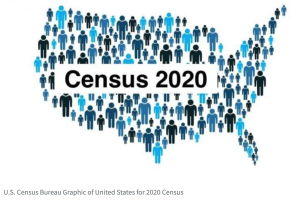
Commentary
-
Our commentary partners will help you reach your own conclusions on complex topics.
If you want a measure of how disingenuous America’s so-called “democracy defenders” are, look no further than their silence on perhaps the biggest story impacting our republican political system for years that you’ve likely heard nothing about.
While the Trump administration was getting savaged by the left over its effort to reinstate a question asking for citizenship status on the decennial 2020 census, the census itself appears to have been corrupted – and almost uniformly to the benefit of one political party.
You’ll never guess which one.
As Heritage’s Hans von Spakovsky, a Republican former Federal Election Commissioner and DOJ Civil Rights official has written, per a post-2020 census survey, the U.S. Census Bureau “significantly undercounted the population of Florida, as well as Arkansas, Illinois, Mississippi, Tennessee and Texas. At the same time, it overcounted the population of eight states, all but one of which is a blue state.”
The Bureau uncovered these errors, as von Spakovsky describes it, by speaking with households across the country and comparing their answers to census questions to the ones they had given in their original 2020 responses.
You’ll be further stunned to note that of all the Democrat states that received overcounts, the largest overcount error came in none other than the state of Delaware, home of Joe Biden, overcounting by 5.45%.
Why do the census counts matter so much?
Well, the decennial census provides the population numbers that are used to apportion the 435 House seats, for redistricting, and to determine how hundreds of billions of dollars in federal funds are allocated each and every year.
So if you get the counts wrong, your state may get more representation and more tax dollars than another. It could swing control of the House or even the presidency.
According to von Spakovsky, as a result of these errors, historically blue Minnesota should have lost a congressional seat. It didn’t. Purple Colorado was given a new congressional seat. It shouldn’t have been granted that seat. Same goes for Rhode Island.
Meanwhile, Red Texas should’ve gained one seat and Florida two. They didn’t. Population miscounts numbered in the hundreds of thousands within individual states according to the survey.
By contrast, in the 2010 post-census survey yielded a statistically insignificant error rate of 0.1% — with the bureau apparently erring in its count by 36,000 Americans.
Until the 2030 census, these errors will not be remedied. That’s a decade of distortion in our republican system, where the citizens are not adequately represented in Washington D.C.
Yet our political class is totally silent.
It’s deafening among those who claim democracy and our elections are under threat that they are not demanding answers for why the census was so wrong, and what to do about restoring the voting power of those disenfranchised because of it.
That tells you that those who claims to care about democracy, well they’re very selective in how they view assaults on our system. And their silence when it comes to the administrative states, mass errors almost solely in one direction, is beyond belief.
Census inaccuracies proves the fraudulence of those who claim to care so much about defending the integrity of our system.
-
‘Deep State’ failed to protect Trump
The stated mission of the United States Secret Service is to “ensure the safety and security of our protectees.” However, on July 13 in Butler, Pennsylvania, the Secret Service allowed a lone would-be assassin to fire a shot at former President Donald Trump, grazing his ear with a bullet. Secret Service Director Kimberly Cheatle resigned…
-
The Regime once again meddling in election to hurt Trump
On Tuesday, July 9, the U.S. Department of Justice issued a cybersecurity advisory warning companies about a Russian social media bot farm. U.S. officials told reporters that these Russian bots are targeting U.S. voter groups in key swing states and implied that the goal is to undermine President Joe Biden. Watch the above video as…
-
Clarence Thomas has it right on presidential immunity case
On July 1, the United States Supreme Court ruled in a 6-3 majority opinion for Trump v. United States that American presidents have absolute immunity from prosecution for actions that fall within their constitutional duties. The ruling asserts that evidence of official criminal acts committed by a president cannot even be presented in any U.S.…
-
SCOTUS’ Murthy v. Missouri ruling will live in infamy
On June 26, the U.S. Supreme Court sided with the federal government in the Murthy v. Missouri case regarding official communications between the government and social media platforms. In a 6-3 decision written by Justice Amy Coney Barrett, the court stated that the plaintiffs did not have the legal standing to seek an injunction against…
-
Anti-Trumpers care about power, not democracy
News commentators across the political spectrum — including some contributors here at Straight Arrow News — have warned Americans about Donald Trump’s aspirations to make himself a dictator and effectively end the American republic if he regains power in November. Their warnings cite Trump’s own legal arguments, public statements and past behavior, including the attempted…
Latest Opinions
-
 U.S. Department of Defense
U.S. Department of Defense
Congress still trying to figure out how to reduce wasteful military spending
-
 DVIDS
DVIDS
US Navy, Air Force making waves with new weapons at RIMPAC
-
 Getty Images
Getty Images
Israeli PM Netanyahu meets with Trump at Mar-a-Lago
-
 Getty Images
Getty Images
Growing US nuclear power resurgence reaches the nation’s heartland
-
 Getty Images
Getty Images
Beer from the sun, other solar thermal projects get government funding
Popular Opinions
-
In addition to the facts, we believe it’s vital to hear perspectives from all sides of the political spectrum.

 The
The 
